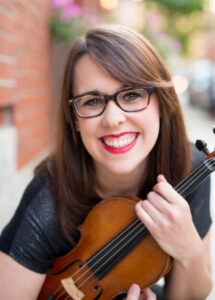The Kronos Quartet announced this week that Longy violin faculty member Gabriela Díaz will join as its newest member alongside violist Ayane Kozasa following the retirement of longstanding ensemble members John Sherba and Hank Dutt. The celebrated string ensemble, which is about to wrap up its 50th anniversary season in June, is a trailblazing musical force, selling the most recordings of any string quartet and winning numerous Grammy awards and nominations.
Of the new members, Kronos founder David Harrington expressed, “We are inspired and thrilled by the imagination, skill, and bold ideas that they will bring to the future work of Kronos.”
A Georgia native and a violinist since the age of six, Díaz is a fierce champion of contemporary music, having worked closely with many prolific composers, including Unsuk Chin, Roger Reynolds, Joan Tower, and more. She has been lauded as “a young violin master” and “one of Boston’s most valuable players.”

Photo: Kate Lemmon
Additionally, Díaz serves as the first chair violinist for the Boston Modern Opera Project (BMOP); co-artistic directs the much-beloved chamber music and outreach organization Winsor Music; and regularly performs with Castle of Our Skins, Radius Ensemble, A Far Cry, and Emmanuel Music.
Díaz’s work underscores her firm belief in the healing power of music and its potential communicative strength. A childhood cancer survivor, she is committed to using her music to support cancer research and treatment. In 2004, an Albert Schweitzer Foundation grant allowed her to create and direct the Boston Hope Ensemble, which Díaz and her colleagues have used to bring performances to cancer units across Boston and cancer research organizations nationwide.
In and outside the classroom, she exemplifies Longy’s mission by encouraging students to use their musical abilities to make a difference in the world. She helps young musicians find their passion and gives them the courage and confidence to let their musical voices be heard, with her career serving as inspiration. When asked about her teaching philosophy, Díaz stated, “It is my hope that young musicians will create a musical path that allows them to truly connect with those who are listening in ways that are personally meaningful to them.”
